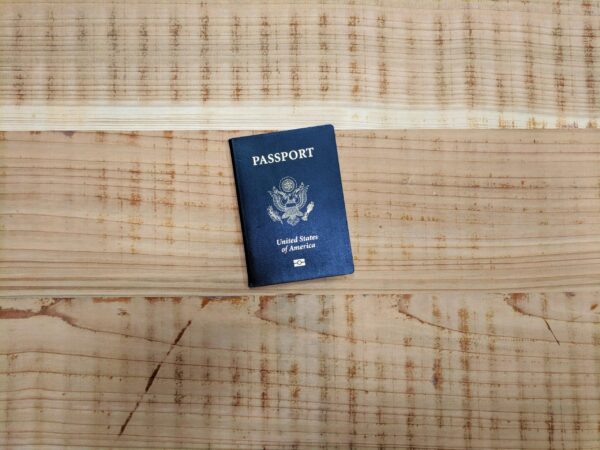
What Trans Americans Need to Know About Getting an Accurate ID
By Erin Carden
With help from VoteRiders, Davia secured an ID with her correct gender marker just before a change to federal policy made doing so harder for Trans Americans.

By Erin Carden
With help from VoteRiders, Davia secured an ID with her correct gender marker just before a change to federal policy made doing so harder for Trans Americans.
Davia’s heart sank when she heard the news that, after January 20, 2025, trans and nonbinary Americans could no longer get a passport with their correct gender marker.
She had applied for a new passport card just six days before the news broke. After years of struggling with her identity, Davia was finally ready to be seen for who she truly is.
Now she was terrified she’d missed her chance.
And then, it arrived. Inside an envelope she’d received in the mail was her passport card featuring the letter “F” under gender. She sighed in relief.
“I was in shock,” Davia said. “It made me feel like I got my power back. I know who I am. I know how I feel. I’m confident now. The government is backing me up on this— this is who I am.”
For Davia, getting a new identification was about validation, but it was also about survival. When she first connected with VoteRiders through TransSocial in November 2024, Davia was facing a crisis—she was about to lose her home because she didn’t have an acceptable ID.
Her driver’s license was missing, her birth certificate was too old and damaged to use, and she had never even seen her Social Security card. Without an ID, Davia couldn’t prove her identity or keep her home.
In Georgia, VoteRiders and TransSocial co-hosted a Passport Clinic to help LGBTQIA+ voters legally update their name, gender marker, and ID documents. When a TransSocial employee learned about Davia’s dire situation, they knew exactly where she could get free help fast. Thanks to their recommendation, Davia attended the next Passport Clinic and was connected with Susan, a trained VoteRiders volunteer. Together, they made a plan that would get Davia the ID she needed to keep her home.
Susan helped Davia figure out what ID documents she needed, schedule her appointments, and fill out paperwork. She arranged free rides for Davia to each appointment and covered all the costs. On top of all of this, she provided Davia with emotional support, mentorship, and compassion.
“Susan was like a counselor, a companion, a mentor,” Davia explained. “She wasn’t just there to do the work—she was actually willing to help.”
With a new driver’s license, Social Security card, birth certificate, and passport card, Davia gained a sense of power she thought she had lost.
“Getting that passport with my gender marker was a big step,” she explained. “It made me feel real. I feel stronger. I don’t have to depend on someone else to say who I am. This is a federal document—they can’t argue with this. Once people put a label on you, that’s how they’ll treat you.”
Davia got her passport card just days before the federal ban went into effect. In June 2025, thanks to a lawsuit from the American Civil Liberties Union, a court temporarily blocked, restoring the right for trans and nonbinary Americans to update their passports’ gender markers.
In addition to challenges at the federal level, state-level barriers are growing. At least 200,000 transgender voters in the United States don’t have IDs that match their name and/or gender. These inaccurate documents can make casting a ballot, traveling, and participating in everyday activities invalidating and intimidating.
No one should be stopped from voting because the gender marker on their ID doesn’t “match” their gender identity or presentation. Despite this, trans and nonbinary voters often experience harassment, misgendering, or are even wrongly accused of fraud when their gender presentation does not align with their ID.
Thankfully, this is no longer a fear for Davia. Now that she has her passport card, she has everything she needs to vote with confidence and pride.
“People don’t realize that their vote matters—that the numbers matter,” she emphasized. “That train of thought—not believing they have a voice—is going to hold them back.”
Like many Americans, Davia is deeply concerned about voter suppression and policies targeting marginalized groups. With her new passport card, she will use the power of her vote to help elect leaders who are committed to making voting more accessible and who will fight to protect immigrant and transgender communities.
”America is not America without the different cultures and ethnicities that come into this country,” Davia pointed out. “Literally everybody here has done something to build America, and it’s like they’re trying to erase that from history and prevent people from voting.”
If you or someone you know needs ID information or assistance, call or text our helpline at 866-432-8643 or visit VoteRiders.org/help to learn more about how we can help. For more information on how we can work together to support and empower voters in your community, visit VoteRiders.org/partner.
Erin Carden is VoteRiders’ Digital Communications Coordinator.
August 20, 2025.

Documentary proof of citizenship and voter ID laws are two types of policies put in place to deliberately block specific groups of eligible Americans from voting. We’re breaking down the differences in the two policies and how they’re both bad for our democracy.
Read More
VoteRiders CEO and Executive Director discusses with Democracy Docket the unnecessary laws meant to “protect” us from nonexistent, noncitizen voting and ultimately result in the harming of eligible voters.
Read More